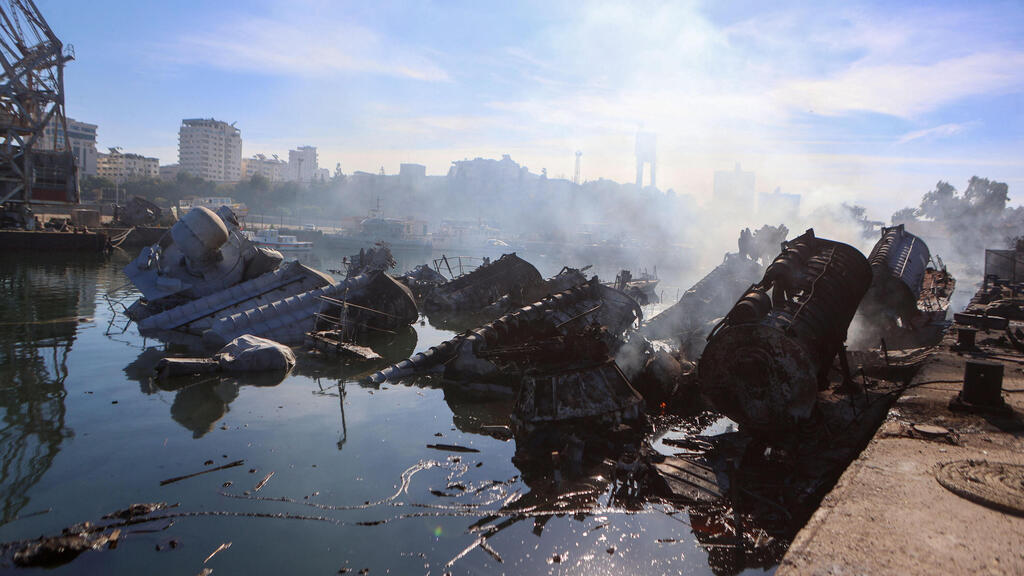Getting your Trinity Audio player ready...
The IDF estimates Tuesday evening that Operation Arrow of Bashan, which began on Saturday night, marks the end of the strategic phase of the offensive in Syria; Meanwhile, Prime Minister Benjamin Netanyahu has reached out to the new regime and in a surprise statement said that Israel wants "relations with the new regime."
In a statement from the Defense Ministries headquarters at the Kirya base in Tel Aviv, hours after his first day of testimony in his corruption trial, Netanyahu said that "we have no intention of interfering in Syria's internal affairs, but we clearly intend to do what is necessary to ensure our security. We want relations with the regime, but if it allows Iran to return or establish itself in Syria or allows the transfer of Iranian weapons or any other weapons to Hezbollah or attacks us - we will respond forcefully. What happened to the previous regime will also happen to this regime."
3 View gallery


Destruction of military equipment after Israeli attack in Syria
(Photo: Delil Souleiman / AFP)
"Within this framework, I authorized the Air Force to bomb strategic military capabilities left behind by the Syrian army, so that they would not fall into the hands of the jihadists. This is similar to what the British Air Force did when it bombed the fleet of the Vichy regime that collaborated with the Nazis, so that it would not fall into the hands of the Nazis," the prime minister added.
Meanwhile, the United Arab Emirates "strongly" condemned the IDF's takeover of areas in the Golan buffer zone. The Foreign Ministry in Abu Dhabi said that it rejects Israel's actions, which "threaten further regional escalation."
3 View gallery


Damage by IDF strikes in Syria; Prime minister reaches out to new regime
(Photos: Prime Minister's Spokesperson, Bakr Alkasem / AFP)
About 80% of Syria's strategic capabilities have been neutralized
During Operation Arrow of Bashan, the IDF says, some 320 strategic targets were destroyed in over 350 airstrikes, which focused on aircraft, weapons depots, missiles and air defense batteries, along with strikes on warships and advanced missiles of the Syrian Navy. The operation, which began overnight between Saturday and Sunday, was conducted in close coordination between the IDF branches, with the Military Intelligence and Northern Command forces leading the planning and execution of the operation on the ground, while maintaining air superiority and maximum protection of the buffer zone. The operation included strategic strikes that involved, among others, the Air Force and the Navy.
The actions taken were primarily intended to harm Iranian attempts to establish themselves in Syria and prevent the transfer of weapons to Hezbollah, while creating a safe buffer zone on the northern border. The IDF estimates that approximately 70%-80% of Syria's strategic capabilities were neutralized during the operation, and additional actions are being taken to ensure that strategic weapons do not fall into the hands of hostile elements.
The IDF emphasizes that this is an ongoing process that requires constant monitoring and accurate intelligence gathering. The army also emphasized that it does not intervene in the internal fighting in Syria, and acts solely to protect Israel and the residents of the Golan. In this context, the IDF said that, despite the activity in the buffer zone, troops are avoiding friction with locals in Syria.
Damage from the attacks on the port of Latakia in Syria
Get the Ynetnews app on your smartphone: Google Play: https://bit.ly/4eJ37pE | Apple App Store: https://bit.ly/3ZL7iNv
At the same time, the IDF continues to monitor the stabilization of the terrain in the various conflict zones, while coordinating with the U.S. and the Lebanese army to prevent the weapons from falling into the hands of terrorist elements and other threats. Even though the Russian army has reduced its presence in the region, the IDF still identifies an Iranian presence and continues to monitor its activities. As part of cooperation with Egypt, high-level meetings were recently held that dealt with regional security issues, and the IDF emphasizes the importance working closely with international partners to preserve security stability.
The IDF initiated the operations in Syria even before it was clear whether the Assad regime had fallen, and in the 24 hours preceding the operation in the buffer zone, it established air superiority and expanded it - which made possible the hundreds of attacks according to the priority of targets: aircraft, coastal missiles, underground bases, ships, weapons depots and weapons production facilities. Scud, cruise and surface-to-sea missiles, radars, tanks, surface-to-air missile batteries were also attacked, and the Air Force also attacked advanced vessels of the Syrian Air Force that had surface-to-sea missiles on them. Intelligence on all the targets was collected over several years, according to the IDF.






